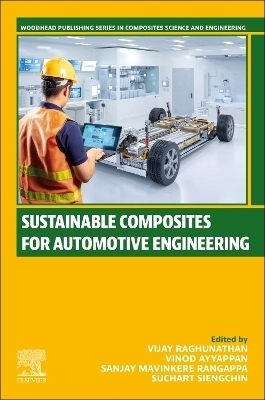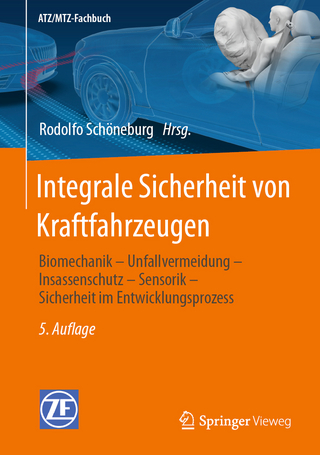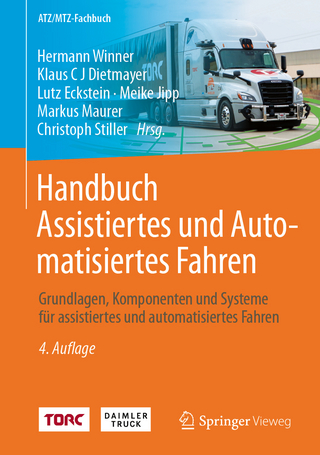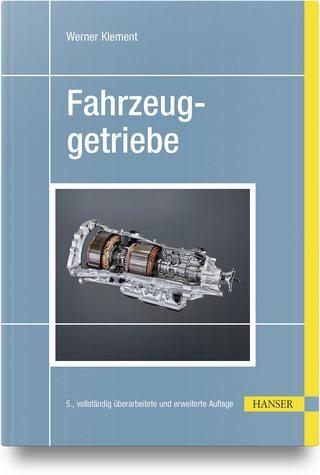
Sustainable Composites for Automotive Engineering
Woodhead Publishing (Verlag)
978-0-443-23669-3 (ISBN)
- Noch nicht erschienen (ca. Mai 2025)
- Versandkostenfrei
- Auch auf Rechnung
- Artikel merken
Dr. Vijay Raghunathan is from the Department of Production Engineering, National Institute of Technology, Tiruchirappalli, Tamil Nadu, India. He did his Post Doctorate in the field of natural fiber and its composites from TGGS, King Mongkut’s University of Technology North Bangkok, Thailand. He received his Bachelor of Engineering in Mechanical Engineering and Master of Engineering in Computer Integrated Manufacturing from Anna University, Chennai, India, in 2012 and 2014, respectively, with university rank. He completed his Doctor of Philosophy in Production Engineering from National Institute of Technology Tiruchirappalli, India, in 2020. His research focused on developing and characterizing automobile brake friction composites in collaboration with academia and industries across the globe. He was awarded the Budding Researcher Award of the Production Engineering Department in 2020 by National Institute of Technology Tiruchirappalli, India. He has published over 75 articles in various SCI and Scopus-indexed journals. He has published seven book chapters, holds 2 Indian patents, and 5 design registrations. He is editing several books for reputed international publishers Dr. Sanjay Mavinkere Rangappa, is currently working as a Senior Research Scientist/Associate Professor and Advisor within the office of the President for University Promotion and Development towards International Goals at King Mongkut’s University of Technology North Bangkok, Thailand. He received his B.Eng. (Mechanical Engineering) in 2010, MTech (Computational Analysis in Mechanical Sciences) in 2013, Ph.D. (Faculty of Mechanical Engineering Science) from Visvesvaraya Technological University, Belagavi, India in 2018 and Post Doctorate from King Mongkut's University of Technology North Bangkok, Thailand, in 2019. He is a Life Member of the Indian Society for Technical Education (ISTE) and an Associate Member of Institute of Engineers (India). Vinod Ayyappan is a research fellow at Department of Materials and Production Engineering (MPE), The Sirindhorn International Thai – German Graduate School of Engineering (TGGS), King Mongkut's University of Technology North Bangkok. He has published more than 20 articles in various articles in SCI and Scopus indexed Journals including Elsevier, Taylor & Francis, Springer, Sage etc. His current research areas include Additive manufacturing, Advanced material technology, Natural Fiber composites, and Polymer Composites. Prof. Dr.-Ing. habil. Suchart Siengchin is President of King Mongkut’s University of Technology North Bangkok. He has received his Dipl.-Ing. in Mechanical Engineering from University of Applied Sciences Giessen/Friedberg, Hessen, Germany in 1999, M.Sc. in Polymer Technology from University of Applied Sciences Aalen, Baden-Wuerttemberg, Germany in 2002, M.Sc. in Material Science at the Erlangen-Nürnberg University, Bayern, Germany in 2004, Doctor of Philosophy in Engineering (Dr.-Ing.) from Institute for Composite Materials, University of Kaiserslautern, Rheinland-Pfalz, Germany in 2008 and Postdoctoral Research from Kaiserslautern University and School of Materials Engineering, Purdue University, USA. In 2016 he received the habilitation at the Chemnitz University in Sachen, Germany. He worked as a Lecturer for Production and Material Engineering Department at The Sirindhorn International Thai-German Graduate School of Engineering (TGGS), KMUTNB. He has been full Professor at KMUTNB and became the President of KMUTNB. He won the Outstanding Researcher Award in 2010, 2012 and 2013 at KMUTNB.
Section-A: Materials 1. The role of lightweight composites in the automotive industry- An overview 2. Natural fibers and their composites in automotive applications- An exploration of different fibers with industrial cases studies 3. The effect of textile advancements on composite performance in automobiles 4. The impact of eco-fillers on the development of composites for automobiles 5. The role of nanomaterials on the strength behavior of automobile composites 6. Recycled industrial waste-based composites for automobiles towards a green environment 7. The role of the matrix in automobile composites- Studies on recent advancements 8. Nanocomposites as a potential corrosion inhibitor 9. Studies on novel filler-modified GLARE laminates for lightweight applications 10. Metal filler-based additive manufacturing for automotive structures 11. The role of ceramic matrix composites for automobile applications: A case study on Industrial Methods 12. The sustainability of composites for automobiles Section-B: Manufacturing Methods 13. Cost-effective methods of manufacturing lightweight composites for automobiles: Recent developments 14. 3D printing in automotive component development 15. Laser Surface Texturing on the tribological behavior of metal matrix composites for passenger car component applications- A case study 16. Additive manufacturing techniques in automotive component development: Fabrication methods and applications 17. The influence of mixing process parameters and its related effects on performance characteristics of Non-Asbestos Organic (NAO) brake friction composites Section-C: Testing 18. Studies on the weathering of composites for automobile applications- Mechanical and Visco-elastic characteristics 19. The influence of dynamic loading on composites for automobile applications 20. The tribological behavior of polymeric composites for automobile applications 21. Durability and Flammability studies of composites for automotive applications 22. Temperature influence on the performance characteristics of automobile composites 23. Corrosion studies on the composites for automobile applications 24. The impact of fibers/ fillers on the acoustic characteristics of composites for automotive components 25. The performance assessment of natural fiber- based automotive brake friction composites 26. Modeling and simulation of automotive components and the process for composite development 27. A crashworthiness study of composites for automobiles 28. Lifecycle assessment of composites in automobile products Section-D: Case studies and Applications 29. The role of fiber-based composites for dashboard applications- A case study on the experimental process 30. The effect of surface treatments and its influence on eco-fiber-based composites for bumper applications 31. Performance of hybrid composites in automotives- Case studies on side intrusion beams and other automobile components 32. A case study on the Tribological behavior of recycled material-filled automobile brake friction composites 33. Rubber-based composites in the automotive field: Case studies on vibration dampers, and Engine mounts 34. Composite joints and connections for automobile applications 35. The role of composites in Electrical vehicles 36. The impact of composites on Ecology: A study on the carbon footprint from an Industrial aspect 37. The performance of existing materials in automobiles, their limitations, and future opportunities in automotive composites
| Erscheint lt. Verlag | 1.5.2025 |
|---|---|
| Reihe/Serie | Woodhead Publishing Series in Composites Science and Engineering |
| Sprache | englisch |
| Maße | 152 x 229 mm |
| Themenwelt | Technik ► Fahrzeugbau / Schiffbau |
| Technik ► Maschinenbau | |
| ISBN-10 | 0-443-23669-0 / 0443236690 |
| ISBN-13 | 978-0-443-23669-3 / 9780443236693 |
| Zustand | Neuware |
| Informationen gemäß Produktsicherheitsverordnung (GPSR) | |
| Haben Sie eine Frage zum Produkt? |
aus dem Bereich


